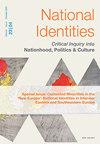西方公民民族主义和东方民族主义二分法的历史
IF 0.7
Q3 POLITICAL SCIENCE
引用次数: 3
摘要
长期以来,公民民族主义和民族民族主义的二分法一直被用于解释“西方”和“东方”民族主义表现形式的差异。尽管经常在经验、方法和规范的基础上受到批评,这种二元论继续在民族主义研究中广泛使用。从汉斯·科恩到约翰·普莱纳茨和欧内斯特·盖尔纳,通过对这种二分法的出现和演变的谱系研究,文章追溯了它与“西方”优越的话语和政策的强烈联系,以及将“东欧”作为“文明西方”的劣等者的半东方化结构。本文章由计算机程序翻译,如有差异,请以英文原文为准。
The history of the dichotomy of civic Western and ethnic Eastern nationalism
ABSTRACT The dichotomy of civic vs. ethnic nationalism has long been applied spatially to explain differences between ‘Western’ and ‘Eastern’ manifestations of nationalism. Though frequently criticised on empirical, methodological, and normative grounds, this dualism continues to find widespread use in nationalism studies. Through a genealogical study of the dichotomy’s emergence and evolution from Hans Kohn to John Plamenatz and Ernest Gellner, the article traces its strong ties to discourses and policies of ‘Western’ superiority, and to demi-orientalising constructions of ‘Eastern Europe’ as the inferior other of the ‘civilized West’.
求助全文
通过发布文献求助,成功后即可免费获取论文全文。
去求助
来源期刊

NATIONAL IDENTITIES
POLITICAL SCIENCE-
CiteScore
1.70
自引率
0.00%
发文量
37
期刊介绍:
National Identities explores the formation and expression of national identity from antiquity to the present day. It examines the role in forging identity of cultural (language, architecture, music, gender, religion, the media, sport, encounters with "the other" etc.) and political (state forms, wars, boundaries) factors, by examining how these have been shaped and changed over time. The historical significance of "nation"in political and cultural terms is considered in relationship to other important and in some cases countervailing forms of identity such as religion, region, tribe or class. The focus is on identity, rather than on contingent political forms that may express it. The journal is not prescriptive or proscriptive in its approach.
 求助内容:
求助内容: 应助结果提醒方式:
应助结果提醒方式:


